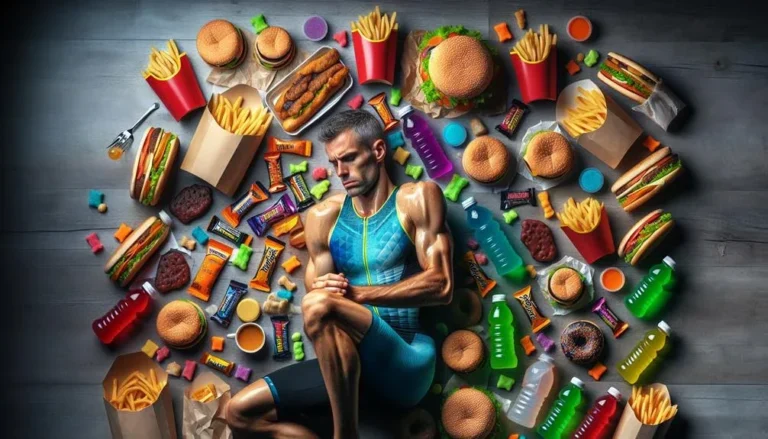When it comes to triathlon training, the impact of nutrition can be a make-or-break factor in performance, an exaggerated truth that many athletes often underestimate.
As I dissect the intricate relationship between nutrition and triathlon, a world where precision is paramount, uncovering the subtle yet significant pitfalls in fueling strategies becomes a priority.
From the fine balance of carbohydrates to the nuanced hydration tactics, the journey to optimal performance is riddled with challenges that demand scrutiny and adaptation.
Join me in unraveling the complexities of nutrition pitfalls in triathlon training, a journey that promises insights crucial for success in this demanding sport.
Key Takeaways
- Precision Fuel and Hydration are vital to avoid common nutrition mistakes.
- Carb intake errors and gastrointestinal issues impact triathlon performance.
- Hydration errors like overhydration can hinder triathlon success.
- Pre-race nutrition planning is crucial to prevent discomfort and optimize performance.
Common Carb Intake Mistakes
Common carb intake mistakes can significantly hinder a triathlete’s performance and overall race experience if not addressed with precision and care. Consuming inadequate carbohydrates during training or races can lead to fatigue, reduced endurance, and compromised recovery.
On the other hand, overloading on carbs without considering individual needs can cause gastrointestinal distress, bloating, and discomfort, impacting performance negatively. Striking the right balance is key – aiming for around 60-90 grams of carbs per hour is a general guideline for amateur triathletes.
Carbohydrates are the primary fuel source during exercise, providing essential energy for muscles to perform optimally. Understanding personal carb requirements and experimenting with intake levels during training can help fine-tune nutrition strategies for improved race performance and overall well-being.
Hydration Errors and Solutions
Hydration plays a critical role in the performance and overall well-being of triathletes, with errors in fluid intake potentially leading to significant negative impacts on race outcomes.
- Overhydration Risks: Excessive fluid intake can dilute essential electrolytes in the body, leading to a condition called hyponatremia, which can be dangerous.
- Dehydration Effects: Insufficient fluid intake can impair performance, reduce endurance, and increase the risk of heat-related illnesses during training and races.
- Individual Fluid Needs: The amount of fluid required varies for each athlete based on factors like sweat rate, environmental conditions, and personal tolerance levels, emphasizing the importance of personalized hydration strategies.
Understanding these hydration errors and implementing effective solutions is crucial for optimizing performance and ensuring a successful triathlon experience.
Pre-Race Nutrition Pitfalls
In the realm of triathlon preparation, navigating the landscape of pre-race nutrition can be a pivotal factor in achieving peak performance and avoiding potential setbacks.
Before a race, it’s essential to avoid common pitfalls that can hinder performance. One mistake to steer clear of is trying new foods on race day, as this can lead to unexpected discomfort. Opt for familiar, easily digestible foods like white bread, rice, or pasta to fuel your body effectively.
Additionally, be mindful of dairy and lactose intolerance considerations when planning pre-race meals. By sticking to a well-thought-out nutrition plan tailored to your needs and avoiding high-fiber, high-fat options, you can set yourself up for success on race day.
Effective Nutritional Strategies
Navigating the crucial realm of effective nutritional strategies in triathlon training involves meticulous planning and tailored approaches to optimize performance and fueling strategies for peak athletic achievement.
- Balanced Macronutrient Intake: Ensuring the right balance of carbohydrates, proteins, and fats to meet energy demands and support muscle recovery.
- Strategic Timing of Nutrition: Incorporating pre-workout, intra-workout, and post-workout nutrition to enhance performance and aid in recovery.
- Individualized Hydration Plans: Tailoring fluid intake based on sweat rate, environmental conditions, and exercise intensity to maintain optimal hydration levels during training and competition.
Caffeine Impact on Performance
With caffeine’s dual potential to enhance performance while also posing risks, understanding its impact on athletic endeavors is crucial for optimizing training and race-day strategies. Caffeine can increase alertness, reduce perceived effort, and boost endurance by mobilizing fatty acids for energy production.
However, excessive intake can lead to restlessness, increased heart rate, and even dehydration. It’s vital to know your body’s response to caffeine and tailor intake based on individual tolerance levels. Guidelines suggest consuming 3-6 mg of caffeine per kilogram of body weight for performance benefits.
Timing is also crucial, with many athletes benefiting from caffeine intake about 30-60 minutes before exercise. By strategically incorporating caffeine into your training and race plans, you can harness its performance-enhancing effects while minimizing potential drawbacks.
Conclusion
As I cross the finish line, I’m reminded of the delicate balance between nutrition and performance in triathlon training. Like a well-tuned machine, my body relies on precise fueling and hydration to propel me forward.
Just as every piece of gear plays a critical role in my success, so too does my nutrition strategy. By avoiding pitfalls and embracing effective strategies, I unlock my full potential as a triathlete.
It’s not just about crossing the finish line, but about fueling my passion for this sport.
